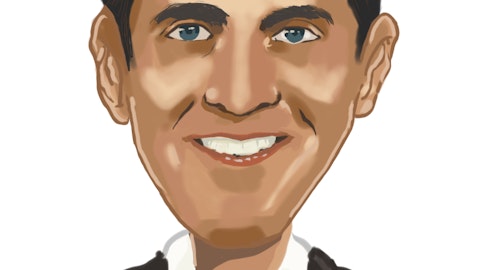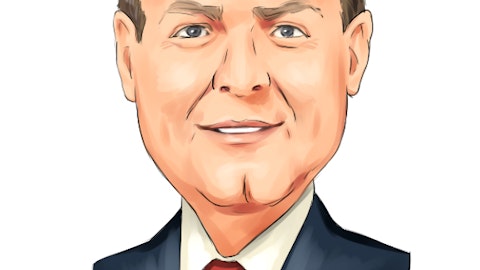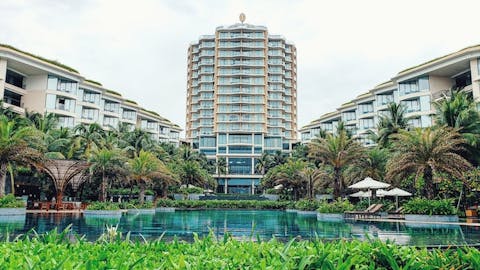Aryeh Klein: Thanks. And if I can squeeze one more in. Just looking at San Jose, you know, it’s obviously a challenged market, but I suppose that occupancy dipped a little bit from last year with tech companies returning to office. What you’re seeing in that market and how do you think that kind of evolves into 2024?
Atish Shah: Yes, I think one of the challenges there is that while there has been more return tech to office, there have also been significant layoffs. So that has masked a little bit of the opportunity to grow occupancy in that market. It’s also true that when people were not in the office, we actually — and it was one of our original strategies from the beginning of COVID — was to attract business from people who were visiting the office, meaning employees who were paying their own way to come into the market to be in the office a couple of days a week. And that business has changed a lot. Though as a result of tech layoffs and a result of requirements to be in the office more days is like a lot of people to come back to be more local to the office.
We have — the Q3 of this year had also never had a particularly good set up for us in that hotel on the group side, as we continue to work with the adjacent convention center on driving more business into that center, but we had always known that that be soft. So those are kind of the two or three components that led to a little bit of softening there. And the flip side is we have seen rate improvement there through to the period as well, in part because I mean it’s not the ideal outcome, but some of that’s because we didn’t have some of the lower-rated group business that we ordinarily have low-rated group business we ordinarily have in that hotel during Q3.
Aryeh Klein: I appreciate the color.
Operator: Thank you. Our next question comes from Austin Wurschmidt of KeyBanc Capital Markets. Austin, your line is open. Please go ahead.
Austin Wurschmidt: Thanks. And good morning, everybody. I’m curious if the recent softness in leisure demand that you highlighted kind of changed your outlook for this segment at all heading into 2024? And were there any specific markets or hotels across the portfolio that you’d highlight?
Atish Shah: Yes. Talked a little bit in prepared remarks. I mean we’re we continue to see a little — a little pullback in both occupancy and rate are really the key leisure markets we’ve talked about for a long time now, which are Napa, Savannah and Key West. Key West, we actually had some lap to renovation last year. So we actually showed growth in Q3 there that was really result of renovation lapping. Again, as I mentioned in the prepared remarks as well, rates are incredibly strong in those markets and we not seen a lot of rate pressure. I think it’s simply a matter of — in each of those markets, if you — we spent 10 minutes on each of them, which we obviously don’t have time for today. Each one of them has their own unique dynamic.
Napa certainly has been impacted by the West Coast in tech slowdown, and layoffs, and things like that. But we continue to be pleased with our good performance in Savannah, despite the year-over-year decline. Charleston’s held up very well in Q3 as well. And again, Key West has always been a tremendous market for anyone that’s invested there. And so, we don’t have a particular view in ’24 that we see anything remotely close to the clients we’ve seen this year. And in fact, we certainly hope that the occupancy levels will stabilize back to the more normal levels, albeit at much significantly enhanced rate over 2019.
Marcel Verbaas: And the only thing I’ll add to those that, from our perspective, we’ve been in these leisure markets for a long time. We didn’t just jump into these markets in the last couple of years, right? So we’re in some really long-term, proven high-demand leisure markets, where we feel very good about the long-term prospects on where those will kind of stabilize and normalize. And, obviously, very important about is in prepared remarks too that we have seen very significant rate growth in those markets, even still compared to 2019. So it doesn’t really change our outlook, as it relates to those particular markets. So I think what we’re seeing is, is really what we kind of expected, which is a softening of kind of the overall domestic leisure trends.
And as Atish pointed out, that is a little bit more significant in the fourth quarter than we initially anticipated, but it’s also not quite being made up by business trends and accelerating, as much as we were projecting a quarter ago. So it’s really kind of the balance of those two things. But we feel good about where we are in those leisure markets. We feel good about the hotels that we have in those markets. And as you know, and as I’ve pointed out a number of times, is kind of gradual shift back — it’s not a bad thing for our portfolio because we do have a very good balance between corporate transients group and leisure demands. And particularly the strength that we’re continuing to see in group is very consistent with what our expectations are, and really plays into where we think we’re going to benefit over the next couple of years, which has — we have assets that are more heavily dependent on that type of business.
We obviously did the additional ballroom at Grand Cypress, where we’re expecting good growth over what we saw in ’17, ’18 and ’19. Certainly what we’re doing in Scottsdale plays into that, where we want to make sure that it’s extremely attractive for all three demand segments, and where that increased group business that we’re going after there is going to be very important for the long-term success of the property. And overall trends in these demand segments, we’re not surprised by what we’re seeing there.
Austin Wurschmidt: Yes. That’s a good segue into my next question. I guess, with respect to the corporate segment, you referenced the 16% delta in occupancy versus ’19 levels. I guess, how does that compare to the beginning of this year? And any specific markets where that corporate demand that has underperformed you referenced into the fourth quarter versus initial expectations or budgets like is it — any specific hotels or markets, or just broad-based?
Marcel Verbaas: Well, I think part of it, it’s twofold from my perspective, and Barry can jump in as well. But we — Orlando, for example is a component of that. And Orlando was a — Grand Bohemian Orlando, which is really a business transient hotel, for the most part, and has some group element to it. Not really very specific — very significantly driven by leisure. And that’s renovation being extended out a little bit. Certainly have a bit of an impact in the beginning of the fourth quarter as well. So, some of our more business-oriented hotels are some of the ones that have undergone some of the renovations this year too. We have seen an improvement in corporate transient, as the year has progressed, where you’re still seeing — where you need to see additional growth is really on the Monday nights and the Thursday nights.



